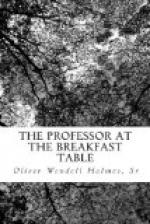The three learned professions have but recently emerged from a state of quasi-barbarism. None of them like too well to be told of it, but it must be sounded in their ears whenever they put on airs. When a man has taken an overdose of laudanum, the doctors tell us to place him between two persons who shall make him walk up and down incessantly; and if he still cannot be kept from going to sleep, they say that a lash or two over his back is of great assistance.
So we must keep the doctors awake by telling them that they have not yet shaken off astrology and the doctrine of signatures, as is shown by the form of their prescriptions, and their use of nitrate of silver, which turns epileptics into Ethiopians. If that is not enough, they must be given over to the scourgers, who like their task and get good fees for it. A few score years ago, sick people were made to swallow burnt toads and powdered earthworms and the expressed juice of wood-lice. The physician of Charles I. and II. prescribed abominations not to be named. Barbarism, as bad as that of Congo or Ashantee. Traces of this barbarism linger even in the greatly improved medical science of our century. So while the solemn farce of over-drugging is going on, the world over, the harlequin pseudo-science jumps on to the stage, whip in hand, with half-a-dozen somersets, and begins laying about him.
In 1817, perhaps you remember, the law of wager by battle was unrepealed, and the rascally murderous, and worse than murderous, clown, Abraham Thornton, put on his gauntlet in open court and defied the appellant to lift the other which he threw down. It was not until the reign of George II. that the statutes against witchcraft were repealed. As for the English Court of Chancery, we know that its antiquated abuses form one of the staples of common proverbs and popular literature. So the laws and the lawyers have to be watched perpetually by public opinion as much as the doctors do.
I don’t think the other profession is an exception. When the Reverend Mr. Cauvin and his associates burned my distinguished scientific brother,—he was burned with green fagots, which made it rather slow and painful,—it appears to me they were in a state of religious barbarism. The dogmas of such people about the Father of Mankind and his creatures are of no more account in my opinion than those of a council of Aztecs. If a man picks your pocket, do you not consider him thereby disqualified to pronounce any authoritative opinion on matters of ethics? If a man hangs my ancient female relatives for sorcery, as they did in this neighborhood a little while ago, or burns my instructor for not believing as he does, I care no more for his religious edicts than I should for those of any other barbarian.
Of course, a barbarian may hold many true opinions; but when the ideas of the healing art, of the administration of justice, of Christian love, could not exclude systematic poisoning, judicial duelling, and murder for opinion’s sake, I do not see how we can trust the verdict of that time relating to any subject which involves the primal instincts violated in these abominations and absurdities.—What if we are even now in a state of semi-barbarism?




